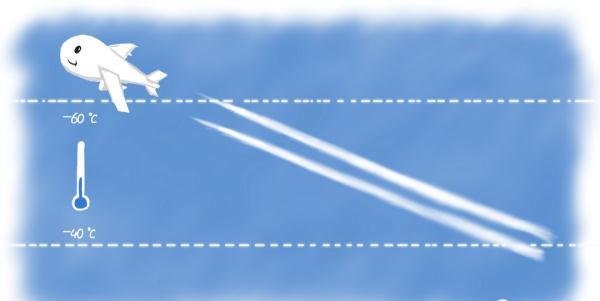People often see jets flying at high altitudes in clear skies, and one or more long "white smokes" appear behind the fuselage. In fact, this is not the smoke from the jet aircraft, but the special cloud system formed by the condensed water vapor after the exhaust gas emitted by the aircraft engine in the high altitude and the surrounding cold air is quickly mixed, which is called the aircraft wake in the aviation flight community and aviation meteorology, which is commonly known as the "aircraft pull line".
Why is it that sometimes you can see the trail cloud, but sometimes you don't?
The formation of trail clouds depends on the temperature, humidity and atmospheric pressure of the ambient air itself. In short, aircraft caulking is only possible when the ambient temperature is quite low (generally at an altitude of 7-11 km, below -40 ° C). When the track cloud is formed, the air temperature is mostly -41 ° C ~ -60 ° C, according to statistics, the aircraft wake that appears in this temperature range accounts for about 86% of the total, if the air temperature is higher than -40 ° C or below -60 ° C, there is generally little aircraft wake.

Usually, when we look up at the sky, we see a trail cloud that might look like this — several "white lines" unfolding in parallel, like "sky zebra crossings."
The image comes from the Internet
So, is this colored "aircraft wake" a track cloud?
Although the low-altitude air show can also see the trajectory of the "airplane pulling line", it is only a special effect of the smoke, not a track cloud.
Understand the principle of formation of track clouds to understand the difference. Imagine that the exhaust gas churning out of the high-altitude aircraft is relatively humid and hot, the water content is much more than the surrounding air, because there is already more water vapor in the atmosphere, the additional water vapor discharged by the aircraft will make the surrounding environment quickly saturated, and the water vapor will condense and freeze into tiny ice crystals. Thus, similar to cirrus clouds, track clouds are mostly made of Xiaoice crystals.
Although the low-altitude aircraft at the air show can also discharge hot and humid exhaust, due to the different surrounding environments, water vapor cannot condense into Xiaoice crystals. Most of the low-altitude performance of aircraft color smoke requires the spray of special chemicals, known as "smoke pulling agents".
Of course, everything is not absolute, as long as the ambient temperature, humidity, and atmospheric pressure are appropriate, let alone aircraft, the exhaust gases discharged by ships can also form track clouds. (Look down, there is a picture of the truth)
Fengyun Satellite
Take you to a different trail cloud!
Usually on the ground, we can only see the more "lonely" track cloud in an upward posture, so what does the track cloud look like from space?
Fengyun satellite monitoring screen
2018.08.22 Wakes of aircraft and ships over the southern Liaodong Peninsula
As can be seen from the image above, the track cloud looks more slender and regular than the naturally formed cloud, as if it can peek out the direction of travel. The track cloud formed by the aircraft (shown by the red arrow) is hidden in the cirrus cloud, but the straight route is clearly recognizable, due to the fast speed, the single point of water vapor on the trajectory is less, so the trajectory is more slender; and the track cloud formed by the ship (shown by the blue arrow), although it is also a linear cloud, has a stronger sense of curve. Cirrus clouds that naturally form in the sky are more divergent and ethereal.
The wakes of these planes and ships are not always easy to identify. On the one hand, because they do not always maintain a neat linear pattern; on the other hand, the trajectory must be large enough and last long enough to be observed exactly as the satellite transits. (Editor complained: it is not easy to find a beautiful picture)
2018.05.07Vill of the southern Italian voyage
2018.06.01Novation of the southern Italian voyage
In southern Italy, two similar trajectory cloud maps reveal regular ship trajectories.
Staggered trail clouds in the sky
Paint a picture of busy transportation
Crisscrossing track clouds over the Bohai Sea
Above the eastern waters of Hong Kong, southwest of the Taiwan Strait, the wakes of planes and boats resemble ribbons pulled up on both sides of the taiwan strait. And such a neat and dense track cloud also witnesses the prosperous picture of China's economic development.
Wakes of aircraft and ships over the southwestern Taiwan Strait (east of Hong Kong).
Let's take a look at the sight of the trail clouds around the world!
The Netherlands, north-eastern Belgium
The sky over London, England, is densely clouded
The wake of the plane crossed the sunny day in France, and to the north was Paris under the cover of the track clouds
Over northern Spain
Over Long Island, New York, USA
Over the world's busiest International Airport in The United States, Atlanta
Trail clouds on the east coast of the United States contrast with those at sea
A trail cloud that runs parallel through the Strait of Malacca
These wisps of trail clouds
It's not just a novel landscape in the sky
It also carries people to communicate with the world
Open up the dreams of the future
It will also continue to innovate
Bring you a different new experience
Waiting for your discovery!